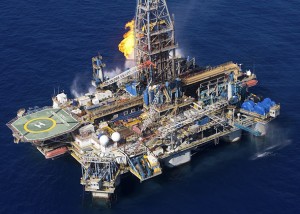It could happen. The world is accustomed to thinking of Israel as an unlucky oilless Middle Eastern country. So when I stumbled across an off-hand reference in Barrons magazine to Israel’s “huge” fracking potential, the implication that Israel might become an oil and gas superpower came as quite a surprise to me.
Israel has already discovered enough offshore gas to satisfy its domestic needs. But what’s really intriguing is the size of its oil shale deposits. If these can be developed, Israel may have more oil than Saudi Arabia.
The 1970s energy crisis prompted President Carter to launch an exploratory synfuels program in 1980, which was abandoned a few years later by the Reagan administration because of crashing world oil prices. Today, new fracking techniques might produce unconventional oil from the huge fields underlying Israel and Jordan at a cost of about $40 a barrel, which is competitive with offshore, tar sands, and fracking sources. Israelis led by a former chief scientist for Royal Dutch Shell are investigating the possibility.
How big is the potential? Some estimates put Israel’s oil shale reserves at 250 billion barrels. By comparison, Saudi Arabia’s conventional oil reserves are though to be 260 billion barrels. That’s enough oil for 2,500 years of Israel’s domestic consumption; but, more importantly, developing this resource could make Israel a major oil exporter.
But this prospect is not without controversy. As in the United States, fracking is controversial in Israel, and oil share development in Israel faces environmental opposition. But if technological feasibility and economic viability line up, it seems unlikely to me that Israel would forego the opportunity to become a major oil producer.
Sources:
http://nypost.com/2013/01/28/fracking-means-a-new-middle-east/
http://world.time.com/2013/04/30/can-israel-become-as-oil-rich-as-saudi-arabia/
Photo: Israeli natural gas platform in the eastern Mediterranean.
